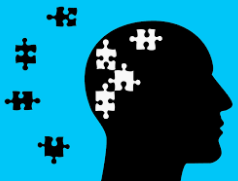Psychiatric Disorders MCQs and Answers :-
1. The patient is preoccupied with normal body functions. This suggests:
- Bipolar disorder
- Borderline personality
- Hypochondriacs
- Obsessive-compulsive disorder
- Schizophrenia
2. A patient with social impairment due to compulsive behaviors likely has:
- Hypochondria sis
- Obsessive-compulsive disorder
- Schizophrenia
- Bipolar disorder
- Borderline personality
3. Compulsive and repetitive behaviors are symptomatic of a borderline personality.
- False
- True
4. Lithium and vaiproic acid (Depakote) are used to treat:
- Bipolar disorder – depressive
- Schizophrenia
- Hypochondnasis
- Borderline personality
- Bipolar disorder – manic
- Obsessive-compulsive disorder
5. Unstable relationships, self-image and emotions are symptoms of:
- Somatoform disorder
- Mood disorder
- Anxiety disorder
- Personality disorder
- Psychotic disorder
6. Slowed speech, psychomotor retardation, weight loss and slow gait are typical symptoms of:
- Bipolar disorder – depressive
- Bipolar disorder – manic
- Hypochondria sis
- Obsessive-compulsive disorder
- Borderline personality
- Schizophrenia
7. Antidepressants should be used cautiously with bipolar disorder as they can trigger a manic episode.
- True
- False
8. Behavior therapy is used to treat the following psychiatric disorders: (Check all that apply).
- Psychotic disorder
- Mood disorder
- Personality disorder
- Somatoform disorder
- Anxiety disorder
9. Selective serotonin reuptake inhibitors (SSRIs) are used to treat schizophrenia.
- True
- False
10. Delusions, hallucinations and distorted thoughts are symptomatic of:
- Anxiety disorder
- Somatoform disorder
- Personality disorder
- Psychotic disorder
- Mood disorder

11. A patient with repetitive thoughts causing stress likely has:
- Psychotic disorder
- Anxiety disorder
- Personality disorder
- Mood disorder
- Somatoform disorder
12. Social withdrawal. difficulty in concentrating, weight loss and slow gait are all symptoms of bipolar (manic-depressive) disorder.
- False
- True
13. Psychosocial treatment and rehabilitation are common treatments for mood disorder.
- True
- False
14. Group and family therapy are used to treat patients with personality disorders.
- True
- False
15. This patient has wide mood swings from elation to deep depression. This suggests:
- Hypochondnasis
- Borderline personate
- Schizophrenia
- Bipolar disorder
- Obsessive-compulsive disorder
17. The patient has sensory, motor or neurological symptoms that don’t follow a recognizable pattern or organic dysfunction. This suggests:
- Bipolar disorder
- Borderline personality
- Schizophrenia
- Obsessive-compulsive disorder
- Hypochondria sis
18. Relaxation techniques are used to treat anxiety disorders.
- True
- Incorrect
19. The patient exhibits apathy. blunted affect and poverty of speech. This is likely a sign of:
- Obsessive-compulsive disorder
- Borderline personality
- Bipolar disorder
- Hypochondnasis
- Schizophrenia
20. The patient has thought disorders and exhibits bizarre behaviors. These symptoms are that of:
- Obsessive-compulsive disorder
- Bipolar disorder
- Borderline personality
- Schizophrenia
- Hypochondria sis
21. The patient exhibits repetitive behaviours such as hand washing, counting and checking the door. These symptoms suggest:
- Schizophrenia
- Obsessive-compulsive disorder
- Hypochondnasis
- Borderline personality
- Bipolar disorder
22. Atypical antipsychotics (clozapine) are used to treat somatoform disorder.
- True
- False
23. Impulsivity and unstable emotions are symptoms of:
- Schizophrenia
- Obsessive-compulsive disorder
- Hypochondria sis
- Bipolar disorder
- Borderline personality
24. The patient exhibits unstable self-image and emotions. This is likely:
- Borderline personality
- Schizophrenia
- Obsessive-compulsive disorder
- Hypochondria sis
- Bipolar disorder
25. A person with sensory or motor symptoms that aren’t related to abnormal physical findings likely suffers from a:
- Psychotic disorder
- Personality disorder
- Mood disorder
- Somatoform disorder
- Anxiety disorder
26. Impulsivity is a characteristic of obsessive-compulsive disorder.
- True
- False
27. Rapid thoughts and speech. hyperactivity and decreased sleep are symptomatic of:
- Psychotic disorder
- Somatoform disorder
- Personality disorder
- Anxiety disorder
- Mood disorder
28. Psychotherapy is used to treat the following psychiatric disorders: (Check all that apply).
- Personality disorder
- Mood disorder
- Somatoform disorder
- Anxiety disorder
- Psychotic disorder
29. Benzodiazepines are used to treat somatoform disorder such as hypochondria sis.
- False
- True